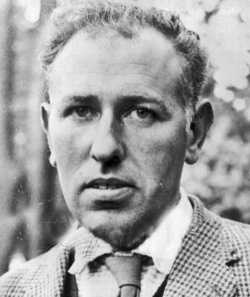Norman Le Brocq was born in Jersey in 1922 and died there on 26 November 1996, aged 74. He was the son of Albert Stanley Le Brocq, a Fruit Grower in St Peter, whose grandfather, Falle Le Brocq, had been born in St Mary, and Maud Eunice Pallot, formerly of St Lawrence. He was renowned firstly as one of the key figures of the island's resistance movement during the German Occupation, helping to shelter Russian forced workers, and in later life as a fiercely independent politician.
Norman le Brocq was a skilled stonemason who had joined the Transport and General Workers Union before the war. The Germans declared unions illegal and Mr Le Brocq, an avowed communist, and his comrades produced illegal leaflets using a duplicating machine hidden in an attic. By the end of 1941 they had set up the Jersey Democratic Movement with a group of socialists. In 1942 the Jersey Communist Party was re-formed. Leaflets for all three organisations were produced in runs of three to four hundred at a time throughout the rest of the war.
The Communists members of the JDM made contact with Soviet and other prisoners of war, involved in forced labour projects on the islands and provided support, information and sustenance to them.
Anti-fascist bulletins were printed and distributed, even in Russian - to keep up the spirits of the Soviet prisoners in the slave camps on the island. Small acts of sabotage reminded the Germans that not everyone was apathetic. The destruction of the island’s German officers’ school, with the loss of nine lives was however a key feature in convincing the occupiers to be wary of the local resistance.
Mr Le Brocq was extremely modest about his exploits, of which he said little. He was secretary of the Channel Islands branch of the British Communist Party for much of the post-war period and was a noted campaigner for working class rights in the field of housing and social policy.
Though strongly opposed by the establishment and local media in several unsuccessful attempts to gain election to the States of Jersey in the 1960s, his participation over a total of 15 years in the 1960s and '70s earned him universal respect for his fair-mindedness and ability.
Jersey Looks Forward
After the Occupation Mr Le Brocq published a book called Jersey Looks Forward, in an attempt to influence the restructuring of the States. As well as looking forward, his booklet also took a backward glance at industrial problems and struggles in the island in the past. Here are some links to extracts from the book.
Social Policies
In Jersey Looks Forward he enumerated the political and social policies towards which he fought, many of which were later adopted by the States of Jersey. These included:
- States members to receive adequate remuneration
- A modern equitable divorce law
- An augmented paid police force acting over the whole island
- Compulsory health insurance
- Compulsory free education to the age of 16
- A maximum working week
- A minimum wage
Biography from Wikipedia
Original page written by Tony Bellows
He participated in the resistance to German occupation in the Second World War, and was one of the founding members of the Jersey Democratic Movement, a broad left movement, of Communists ,Socialists,Liberals and others , which by the end of the war in 1945 had grown to 18. The JDM helped to provide support, information and sustenance to the slave workers brought by the Germans over to Jersey from Russia. In 1966, Le Brocq and 19 other islanders were awarded gold watches by the Soviet Union as a sign of gratitude for their role in the resistance movement.
He was a campaigner for working class rights in the field of housing and social policy, and the Communist Party's leading figure in the Islands. After unsuccessful bids for election in the 1960s, he was elected to the States of Jersey in 1966, which was such a remarkable event that it was noted in the British press - "Working man joins the rulers of Jersey" (Observer 18 December 1966). He remained in the States as a Deputy for Saint Helier until his retirement.
He was president of the Island Development Committee and instrumental in bringing in the first Island Plan, which laid out zones for housing and commercial development and green field sites on which development was not permitted. He was also chairman of the Sea Fisheries Advisory Committee, and a Sea Fisheries vessel is named after him.
Outside of the States, he was a director of the Channel Islands Co-operative Society for 35 years, and its president for 27 of those.

